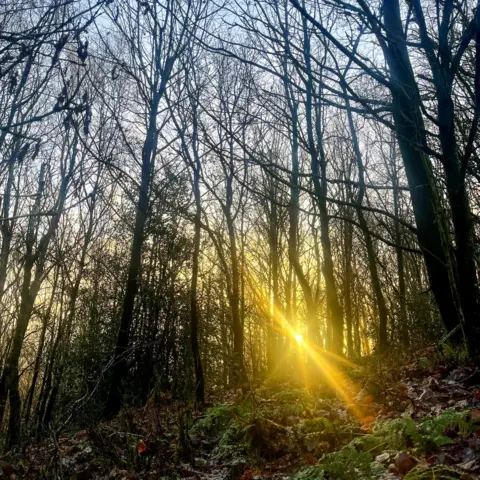UK's old trees critical to climate change fight
 Victoria Gill
Victoria GillUK forests lock away twice as much planet-warming carbon as previously thought, a new study reveals.
The study using lasers and 3D scanning showed that old trees in particular were critical to fighting climate change.
The research mapped almost 1,000 trees in Wytham Wood in Oxfordshire.
"We've found significantly more carbon stored here," said Dr Kim Calders, from Ghent University.
 Markku Akerblom
Markku Akerblom An accurate calculation of the amount of carbon trapped in UK woodland could help inform decisions about how to manage it - in addition to highlighting the cost to the environment of losing that woodland.
Before 3D scanning techniques were available, weighing a tree would mean cutting it down.
The latest research, published in the journal Ecological Solutions and Evidence, produced laser-scanned maps of each tree and converted those into a model.
That gave a measure of each tree's volume which the scientists used to calculate the amount of carbon captured in each tree's trunk and branches. It showed that a patch of UK forest weighs about twice as much as previous calculations suggested.
"When you know the density of the wood, you can convert volume into mass," explains Prof Mat Disney, from UCL. "About half of that mass will be carbon, half is water."
Wytham Wood, one of the most scientifically studied forests in the world, is typical of UK deciduous woodland, meaning the area weighed by scientists affords an accurate estimate of the carbon value of forests across the UK.
"There has probably been an underestimation of carbon in UK woodland, but probably across Europe as well," said Prof Calders.
'Incalculable' value
As well as being important ecosystems, healthy forests remove planet-warming carbon dioxide from the atmosphere.
Prof Disney says the new findings show that, for every square kilometre of woodland lost, "we potentially lose almost twice the carbon sink capacity we thought".
As Prof Robert MacKenzie from the Birmingham Institute of Forest Research pointed out, aboveground forests are "an important, [but] temporary store of carbon that can help us get past the current climate emergency".
"Ultimately," he told BBC News, "we need to stop emitting fossil carbon and lock carbon away for centuries to millennia. Some of that can happen in forests and other soils, and the rest will have to come from carbon capture and storage."
For the near future though, Prof Disney says this research has serious implications for our understanding of the benefits of protecting trees, in terms of climate change. And the complex structure of mature trees in particular means they play a role that is very difficult to replace by simply planting more trees.
"The value you have in large mature trees is almost incalculable, and so you should avoid losing that at any cost - regardless of how many trees you think about planting," said Prof Disney.
"Those large trees are incredibly important."
Follow Victoria on Twitter
